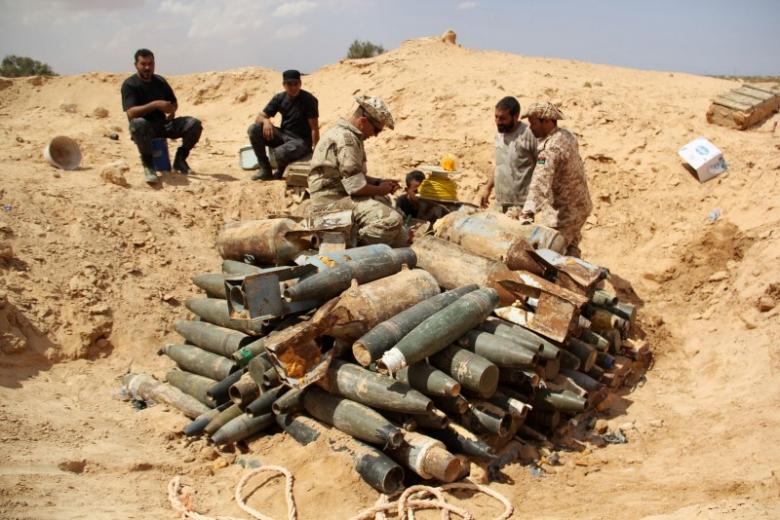
Libyan militia watch over explosives and shells left behind by Islamic State soldiers in the battle over the city of Surt, Libya on Sept. 9, 2016. The Islamic State is believed to have been driven out of Surt, a strategically-placed coastal city. (REUTERS/Stringer)
Many inside and outside of Libya had hoped that the overthrow of dictator Muammar Qaddafi in 2011 would herald a new era of stable and open government. Yet the five years since have been dominated by civil war and power struggles. Multiple governments claim authority, no one really knows who is in charge, and stability remains a long-off goal, not even close to a reality. Recent hostilities indicate how violence and uncertainty remain the norm.
The Islamic State has maintained a presence in Libya for some time. But in August 2016 some progress was made to reduce their influence. A Libyan militia, under the auspices of the UN-backed government in Tripoli (presumably- more on this in a moment) and with American air support, took control of the coastal city of Surt (written in some sources as Sitre).
But the victory may be short-lived. The militia who took the city came from the city of Misurata. According to the New York Times, they are only “nominally” affiliated with the Government of National Accord (GNA), a newly formed body created with the support of the UN and recently acquiring backing from the Arab League and African Union. It is, worryingly, unclear whether the Misurata militia will continue to take orders from the GNA. A Libyan military official, Ahmed ed-Mesmari, stated that “We don’t think anyone can control these forces. They are anarchists and extremists…They would be very hard to tame.”
Despite the involvement of international organizations, the GNA has several challengers who claim to be Libya’s legitimate government:
And this is just the tip of the iceberg. Mesmari estimates there are up to 40 militias and gangs in Tripoli with constantly shifting allegiances. Further complicating matters, these groups are not just fighting for political power, but control of and access to Libya’s extensive oil reserves. Needless to say, the political and military situations in Libya are quite murky and ever-evolving.
The importance of oil in the power struggle became clear on September 11, 2016 when militia loyal Gen. Hifter attacked three major oil terminals. This July a three year embargo on oil exports from Libya, but this aggressive maneuver as well as political infighting and economic decline have put the country’s ability to capitalize on its oil in serious jeopardy.
However, some hope to restoring order and commerce emerged on September 18—one week after the seizure by Hifter’s forces—Eastern Libyan troops reclaimed two of the ports and expected normal operations to resume the next day. In fact an oil tanker was docked at one of the ports, the first ship to do so in Libya in the last two years. Libya’s national oil company expected its exports to reach 600,000 barrels per day one month from now, and 950,000 barrels per day by the end of the year.
Also on Sept. 18 the Misurata militia continued their campaign against Islamic State forces in Surt. The militia has been scouring the city neighborhood by neighborhood to root out enemy fighters. However, a spokesman for the militia acknowledges that some enemy soldiers may have escaped and are still at large.
While the support of international organizations to stabilize Libya could make worthy contributions, the driving force for consolidating power in a national body of government recognized by all Libyans must come from Libya. Despite the multitude of factions and tribes and political groups, continuing with a fragmented system is not sustainable. Leaders of these disparate groups must find a way to reach a workable agreement, perhaps a power-sharing arrangement that includes all major claimants to begin with.
Without commitment to reaching some acceptable compromise, stability in Libya will remain a long-off goal rather than a viable reality.